Key takeaways:
- Personal security apps enhance safety through features like emergency alerts and location tracking, providing users with immediate access to help.
- Understanding privacy implications and data practices is crucial when choosing security apps, as it affects both personal security and information protection.
- Effective security apps should have real-time tracking, user-friendly interfaces, and robust privacy settings to ensure both safety and user trust.
- Personal experiences highlight the importance of being proactive and vigilant about app permissions and functionality in maintaining one’s security.
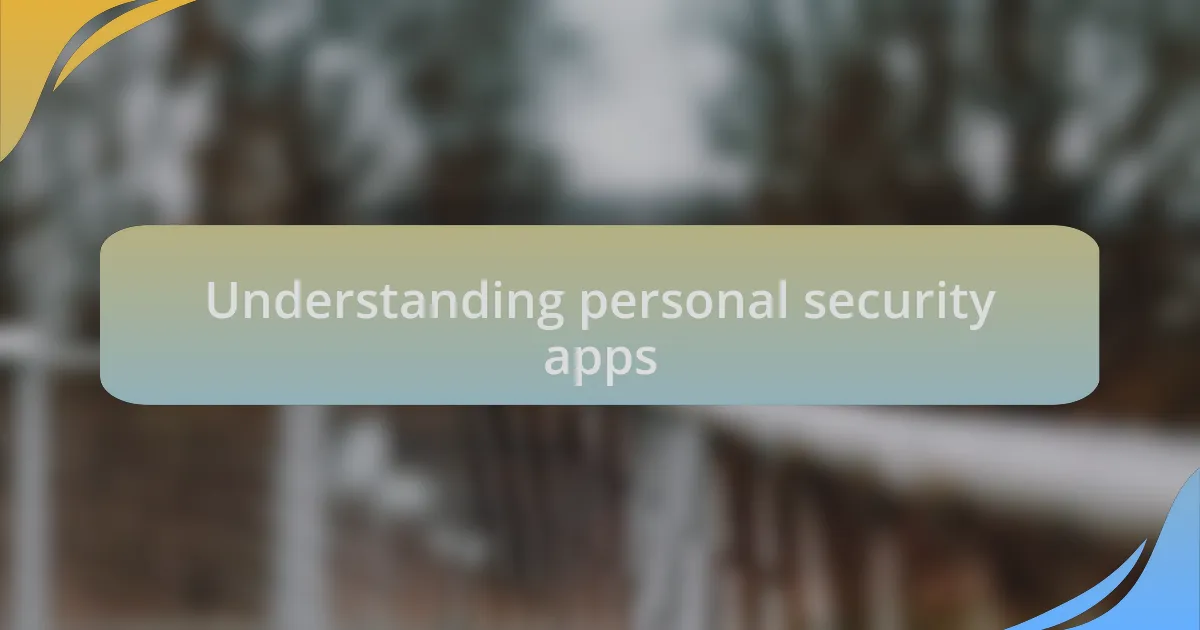
Understanding personal security apps
Personal security apps have become an essential part of our daily lives, acting as a digital shield that enhances our safety. I remember the first time I used one—it felt empowering knowing I had immediate access to help at my fingertips. How often have you found yourself in a situation where help was just a click away? That instant support gives a sense of security that is hard to quantify.
These applications often come with a variety of features, from emergency alerts to location tracking. When I travel alone, I always activate my security app. The notion of someone being able to pinpoint my location instantly eases my anxiety, even if I’m just out for a late-night jog. It raises the question: how much more at ease could we feel if we all embraced these technologies?
Moreover, understanding the privacy implications of these apps is crucial. I’ve had friends express their concerns over data sharing, worried it might compromise their safety instead of enhancing it. It’s a valid point—how do we balance between feeling secure and protecting our personal information? In my experience, being informed about what data these apps collect allows me to make more confident choices about which tools to trust.
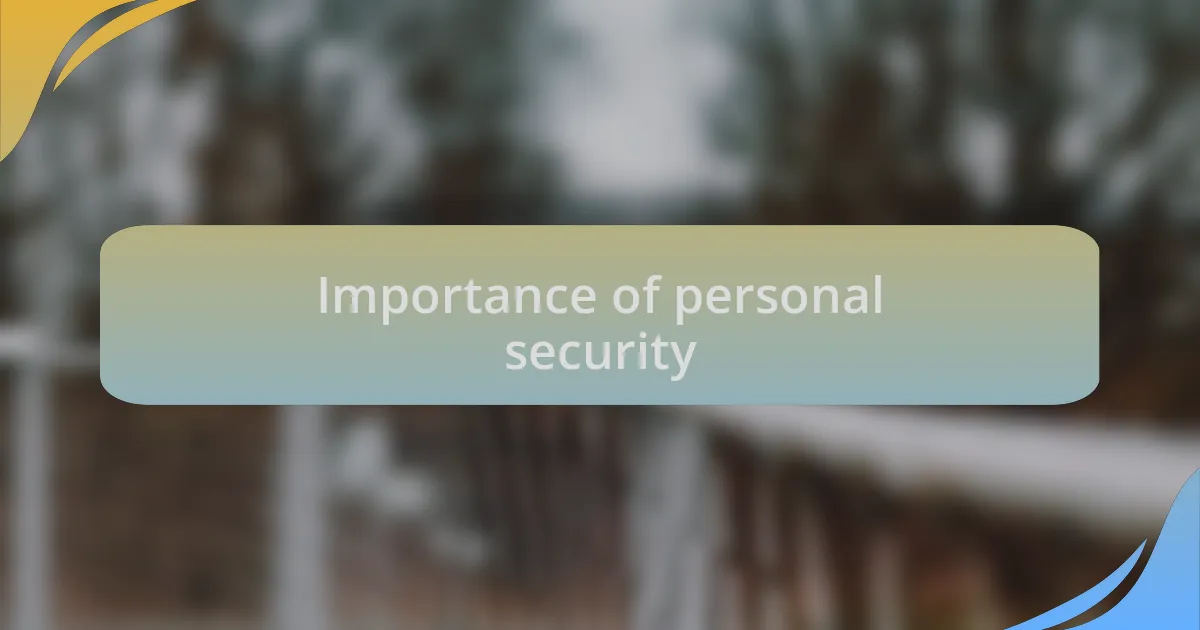
Importance of personal security
The importance of personal security cannot be overstated in a world that often feels unpredictable. I recall a moment when I was home alone during a storm; the power went out, and I felt a wave of vulnerability wash over me. That’s when I realized just how crucial it is to have measures in place that can quickly alert someone in case of emergency. Have you ever felt that chilling sense of unease when you’re alone or in an unfamiliar place? It’s at those times that personal security becomes not just recommended, but essential.
In today’s digital age, personal security goes beyond physical safety. I’ve had instances when I’ve received alerts from my security app about unusual activity around my neighborhood, leading to quick action that could prevent a potential crime. This proactive approach to security allows us to feel a bit more in control. How comforting is it to know that you have a tool that watches out for you when you can’t?
Emphasizing personal security also means fostering a culture where individuals prioritize their well-being. I’ve often conversed with friends who resist using these apps, thinking they can handle situations on their own. But I gently remind them of the unpredictable nature of life. Why take that chance when a small step toward digital security could make a significant difference? After all, feeling secure is about being prepared, and nothing says preparedness quite like having the right tools at your disposal.
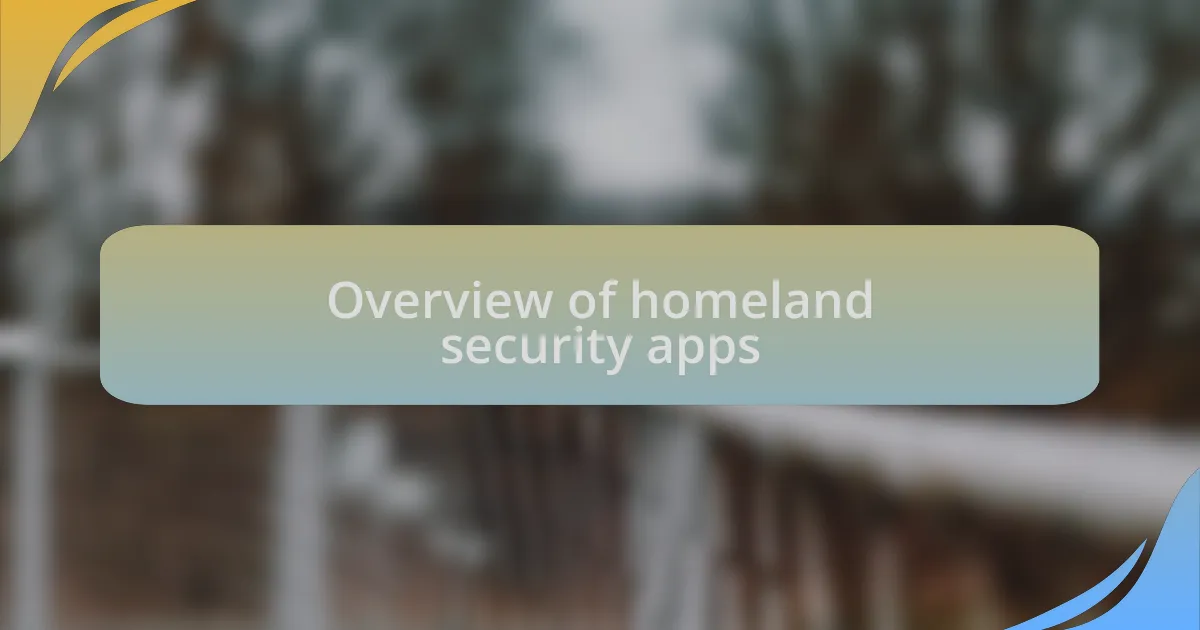
Overview of homeland security apps
Homeland security apps have emerged as vital tools in enhancing personal safety in an increasingly unpredictable world. I remember the first time I downloaded a neighborhood watch app; it was eye-opening to see real-time crime reports and alerts directly on my phone. It made me more aware of my surroundings and reminded me that vigilance can come from being informed and connected to my community.
These apps often serve multiple functions, such as providing emergency alerts, facilitating communication with local authorities, and offering resources for safety tips. One evening, while out for a jog, I received an alert about a nearby incident. The immediate notification allowed me to alter my route and avoid potential danger, turning a routine run into a safer experience. Have you considered how these apps might serve as your personal safety companion?
In addition to their practical uses, homeland security apps also foster a sense of community engagement and support. I often share information I receive through these apps with friends and family, creating a network of awareness that reinforces our personal safety. By empowering ourselves with information and tools, we create an environment where security isn’t just a solitary concern but a collective mission. Why not take advantage of these technological advancements to enhance your own safety and that of those around you?
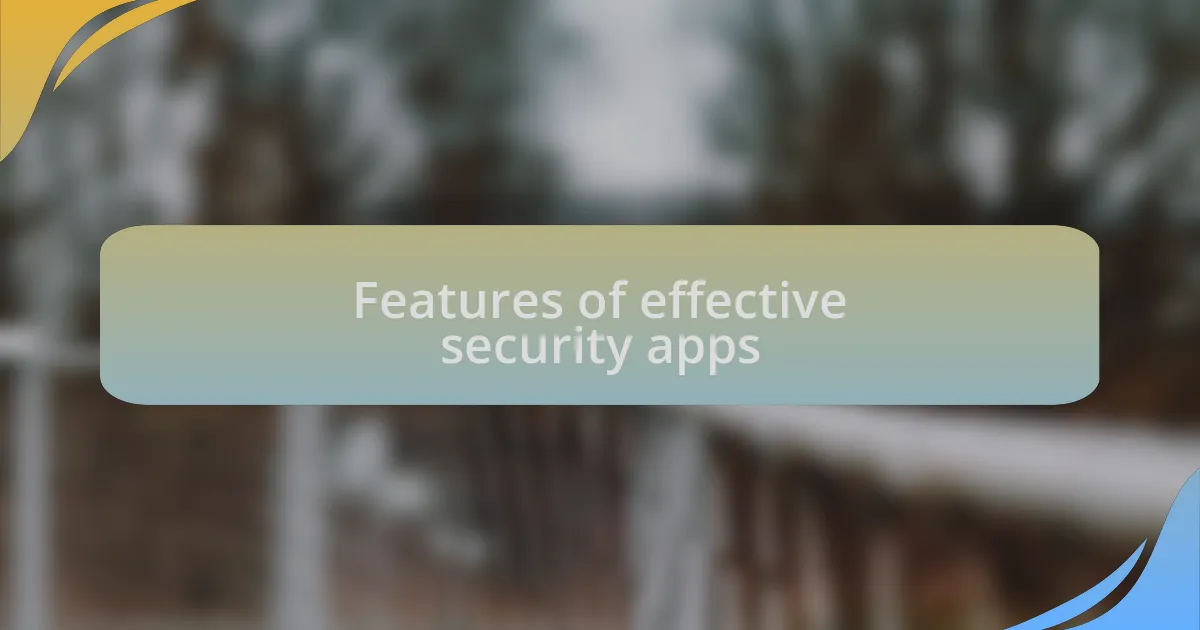
Features of effective security apps
When evaluating security apps, one of the most crucial features is real-time location tracking. I vividly recall a time when my daughter was out with friends, and I could check her location through the app I had installed. It not only gave me peace of mind but also allowed her to feel secure knowing I was just a tap away if she needed help. Isn’t it reassuring to have that sort of connectivity in our fast-paced lives?
Another key feature is user-friendly interfaces that make navigation seamless. I’ve tried apps that were overly complicated, and I found myself frustrated when time was of the essence. A straightforward design means you don’t have to struggle; everything should be just a click away, especially in emergencies. Have you ever been in a panic where every second counts? In those moments, simplicity can be a lifesaver.
Lastly, effective security apps need robust privacy settings. I remember hesitating to share my data initially, but with the right app, I felt secure knowing that my information was safeguarded. Balancing personal security and privacy is essential; after all, how much trust do we place in these technologies if we can’t protect our personal information? The best apps make this a priority, ensuring users feel safe both physically and digitally.
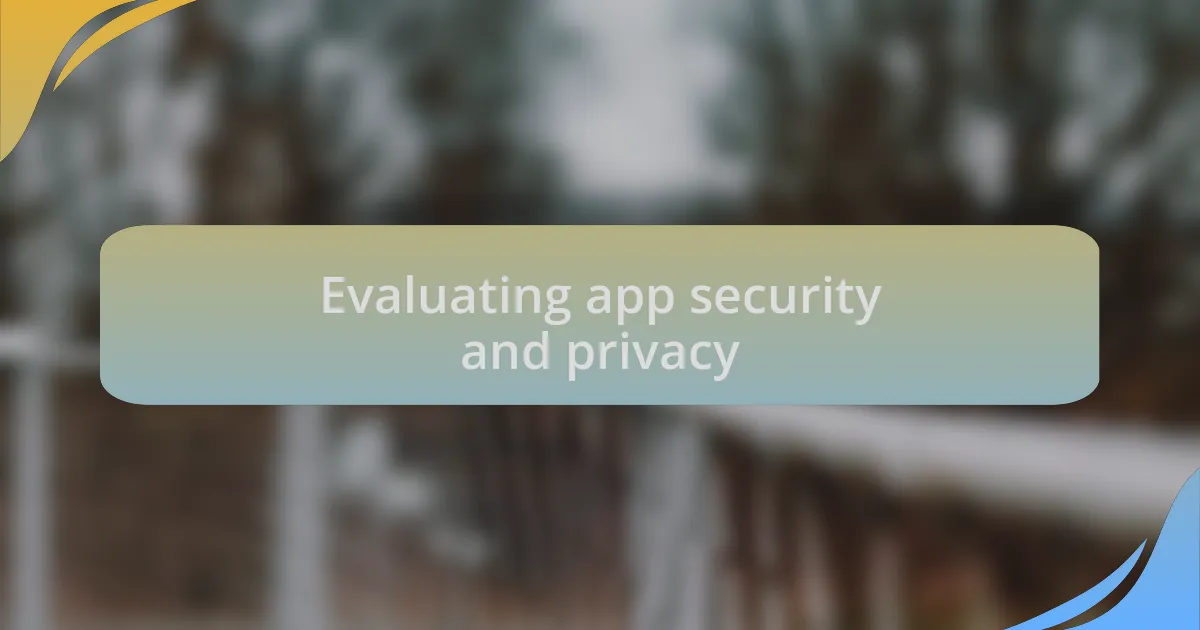
Evaluating app security and privacy
When I evaluate app security and privacy, I often look at how transparent the developers are about their data practices. I remember diving into the privacy policy of an app I was considering; it felt like unraveling a mystery. Understanding how my data would be used, stored, and shared brought clarity, and it also raised questions in my mind. If I couldn’t easily grasp their terms, could I trust them with my personal information?
I’ve also learned the hard way that app permissions can be a red flag. There was a time I downloaded what seemed to be a useful app, only to find it requesting access to features unrelated to its function. I ended up deleting it, realizing that such overreach is often a sign of potential misuse. Have you ever faced a similar situation where the app didn’t seem to respect your privacy? It made me reflect on how important it is to scrutinize these requests for my own security.
Additionally, I find comfort in knowing that reputable apps often have built-in security features, like two-factor authentication. I once set this up on my favorite personal safety app, and I felt a wave of reassurance wash over me. It’s like locking the door twice before leaving home; it not only protects me but also reinforces my commitment to privacy. Isn’t it empowering to take control over our own security measures in this digital age?
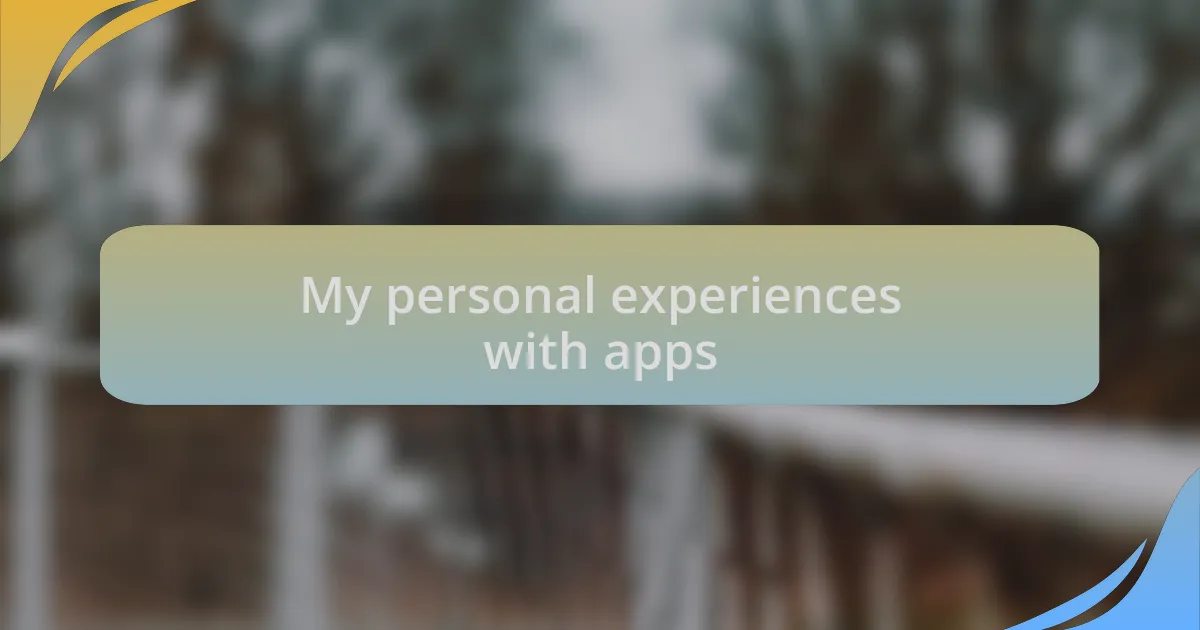
My personal experiences with apps
There was a time when I stumbled upon a self-defense app that promised to alert my friends if I felt unsafe. I was curious but hesitant, so I downloaded it after some careful consideration. The moment I pressed that alert button during a late-night walk and felt my phone vibrate with confirmation, a weight lifted off my shoulders. It was like having a safety net, and it really made me appreciate how technology can be a lifeline in tough situations.
On another occasion, I tried a location tracking app while traveling solo. Initially, I was excited about sharing my journey with friends in real-time. But one evening, as I realized the app was running in the background without my explicit permission, I felt an unsettling sense of vulnerability. Have you ever experienced that nagging feeling that something just wasn’t right? This taught me the importance of not just downloading an app but being vigilant and proactive about knowing what my devices are doing.
I recall a period when I frequently used a personal safety alarm app during my commute. The repeated alerts made me feel empowered, like I had an extra layer of protection. However, I also experienced a moment of frustration when it failed to connect in a crowded area. That day, I understood that while apps can enhance our security, they aren’t infallible. Isn’t it interesting how relying on technology requires us to balance trust and caution simultaneously?